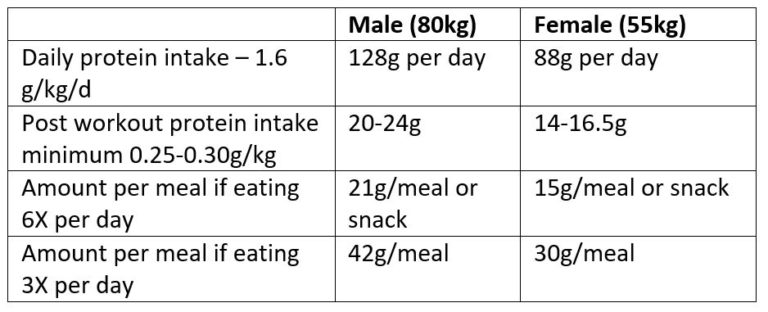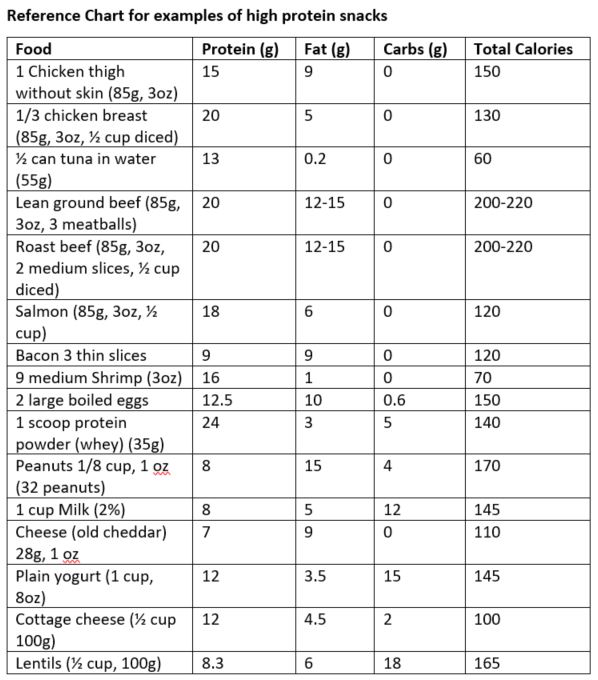In order to build skeletal muscle there needs to be an overall increase in synthesis and a decrease breakdown. Resistance training causes muscles to breakdown and then rebuild if there is enough protein for the rebuilding process to occur. The main nutritional factors that stimulate muscle protein synthesis are:
- Amino acids from eating protein – particularly leucine, a branched chain amino acid that signals protein synthesis
- Amount and timing of nutrient intake – consuming protein within1-2 hours of exercise is important so that building blocks (amino acids) are available for protein synthesis, and consuming the required total amount per day ensures that synthesis always outweighs breakdown
- Co-ingestion of nutrients – carbohydrates help to reduce the amount of protein breakdown
- Creatine is clearly effective for increasing muscle mass in combination with resistance training
Some terminology
DRIs – Daily Reference Intakes
- RDA – Recommended Dietary Allowance – the minimum amount of protein required to prevent deficiency in healthy people – loss of lean mass, amino acid requirement, nitrogen balance, for 97.5% of the population
- EAR – Estimated Average Requirements – an estimated amount that meets the requirement of half of healthy individuals
- AMDR – Acceptable Macronutrient Distribution Range – the ratios of carbs, fat, and protein that make up the diet
What are the current guidelines?
We measure protein in grams per kg of body weight per day – g/kg/d
The Institute of Medicine established these recommendations in 2005
- RDA – 0.8 g/kg/day
- EAR – 0.66 g/kg/d
- AMDR for protein is 10-30% of total daily intake
However….
The amount of protein we need depends largely on our body mass and net energy balance based on physical activity. The RDA and EAR values are NOT adequate for building muscle.
Sport Nutrition references suggest protein should be 30-40%, carbs should be around 30-40% and fat should be around 20-30%
How much protein do we need to build muscle?
For building muscle mass and for maintaining muscle mass through a positive muscle protein balance, internationally recognized professional organizations such as Academy of Nutrition and Dietetics, Dietitians of Canada, and the American College of Sport Nutrition recommend protein intakes between 1.2-2.0 g/kg/d for physically active individuals. The International Society of Sports Nutrition recommends between 1.4-2.0 g/kg/d. Higher intakes in the range of 2.3-3.1 may be required to maximize the retention of lean body mass in resistance-trained subjects during hypocaloric periods, such as body builders intending to get lean before competition.
There is extensive evidence that suggests higher protein intakes (1.2-2.0 g/kg/d) has multiple benefits:
- Leaner body composition in resistance-trained individuals – increases the body’s ability to burn fat
- Muscle preservation when consuming lower calorie diets
- Limits age-related muscle loss
- Limits pathologically-related muscle loss
- In pathological situations such as cancer, COPD, sepsis, infection, HIV, burns, etc., the body requires more protein synthesis than during healthy conditions and it has been shown that intakes of 1.5g/kg/d or more are associated with positive protein balance, improved clinical outcomes, and lower mortality.
- Higher protein intake = smaller waist circumference. Waist circumference is highly associated with metabolic syndrome that is a significant risk factor for cardiovascular disease.
- Beneficial for bone density
- Hunger is decreased
- Positive impact on mood
From the book Thinner Leaner Stronger by Mike Mathews “While the scientific search for the ‘one true diet’ continues, there’s one thing we know for sure: it’s going to be high in protein.”
If a low amount of protein is consumed, the body will break down muscle to have amino acids to make many other substances including hormones, neurotransmitters, plasma proteins, enzymes, cell membrane transporters, and antibodies.
It is well documented that consuming protein following resistance training improves muscle strength and hypertrophy – Sports nutrition recommendations for post-exercise protein consumption are 0.25-0.30g/kg

The accepted average minimum daily protein intake that is favorable for adaptations to resistance exercise is 1.6 g/kg/d – so what does that look like? It is common among body builders and power lifters to eat several meals per day. You could have 2 meals with 2 snacks in between each, or 3 or 4 larger meals, whichever way will work the best, as long as you get the total amount you need during the day and as long as you can spread it out during the day. Here are some example eating schedules.

Protein is 4 Calories per gram, so for 20g of pure protein that is 80 Calories, but no foods are pure protein so total calories will include fat and carbs.

Are there risks with eating a high protein diet?
There are some common perceptions associated with high protein diets: it will affect kidney function, bone density, increase risk of cancer and heart disease, and increase inflammation. These concerns are generally unfounded. If you would like to read other research on this topic, this paper has sited many references in section 3 “Protein Misconceptions and reality”
A major issue with many studies that show an increase in cancer or inflammation with high protein diets is the lack of using whole foods. Extracted protein concentrates do not affect the body in the same way as whole foods. It is similar to the idea that eating sugar in whole fruit does not have the same impact as pure refined sugar.
Note – this article is only about protein. A complete diet should still include a lot of plant foods.

